Understanding the Human Services: Health and Social Care
VerifiedAdded on 2023/01/09
|10
|3006
|100
AI Summary
This document provides an in-depth understanding of the needs, relationship, duties, and policies related to service user groups in the field of health and social care. It focuses on two specific user groups: dementia and old age people. The document discusses the needs of these user groups, the relationship between professionals and users, the main duties and responsibilities of professionals, relevant policies and legislation, and recommendations for improving the professional role. The document also includes a reflective commentary on a presentation related to these topics.
Contribute Materials
Your contribution can guide someone’s learning journey. Share your
documents today.
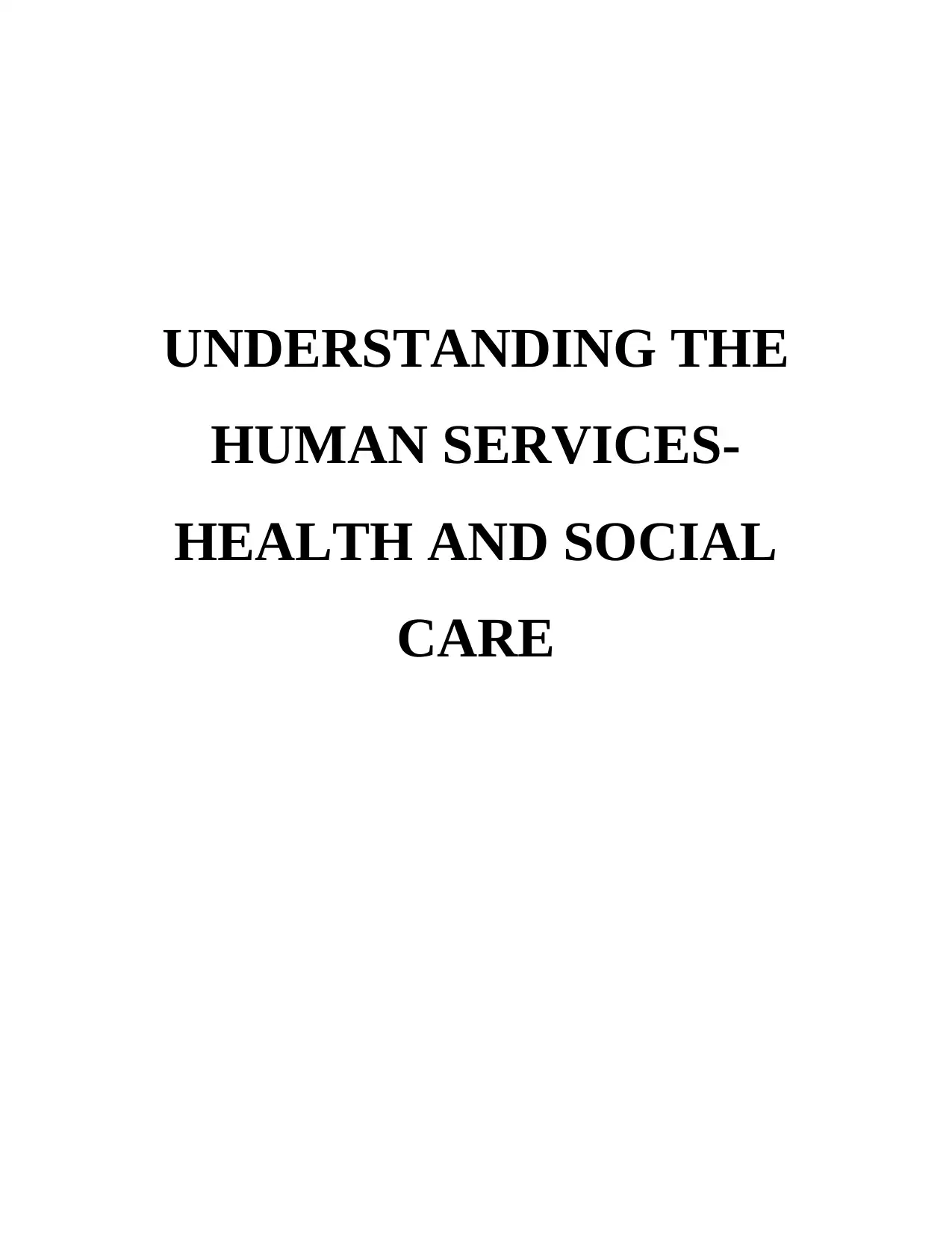
UNDERSTANDING THE
HUMAN SERVICES-
HEALTH AND SOCIAL
CARE
HUMAN SERVICES-
HEALTH AND SOCIAL
CARE
Secure Best Marks with AI Grader
Need help grading? Try our AI Grader for instant feedback on your assignments.
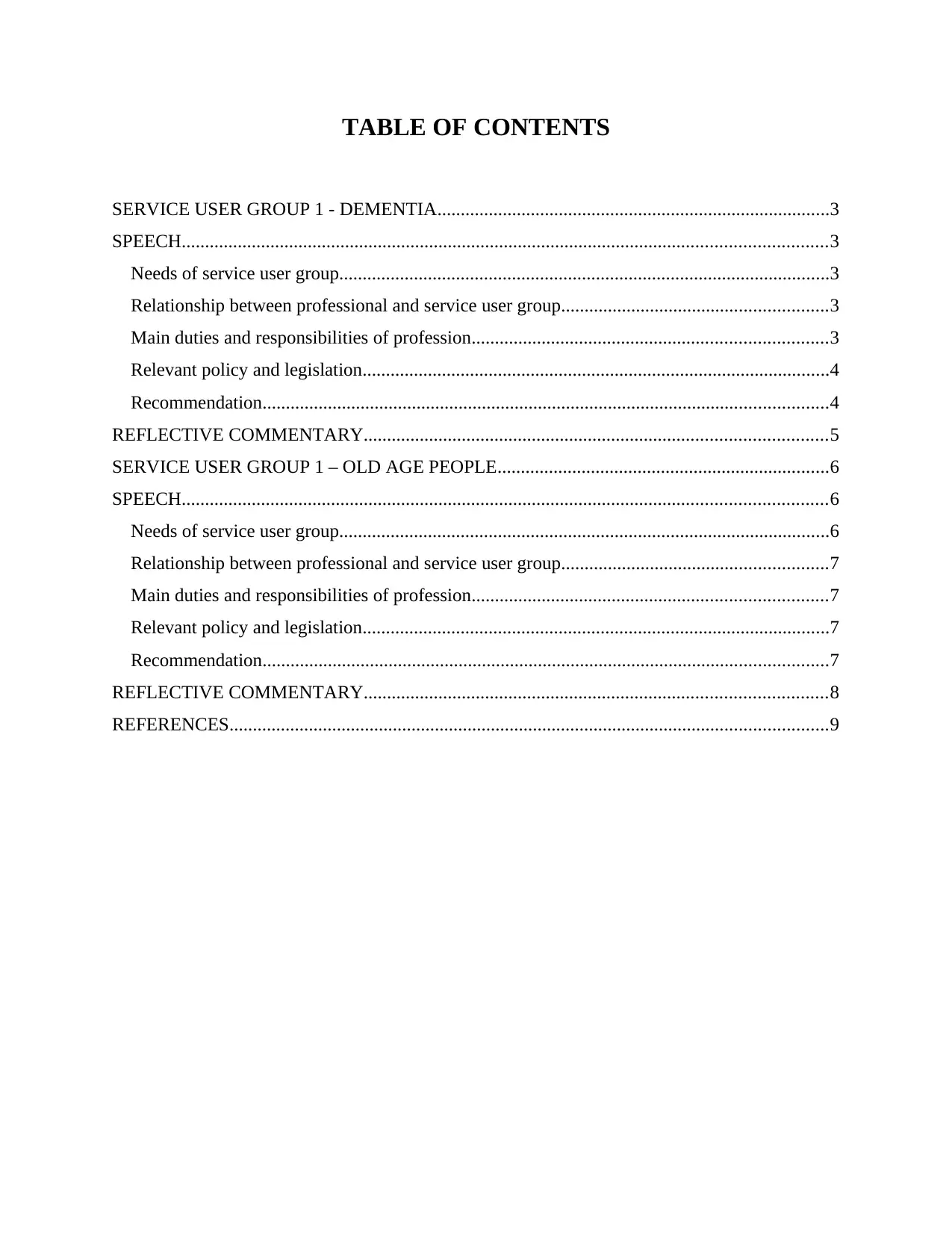
TABLE OF CONTENTS
SERVICE USER GROUP 1 - DEMENTIA....................................................................................3
SPEECH..........................................................................................................................................3
Needs of service user group.........................................................................................................3
Relationship between professional and service user group.........................................................3
Main duties and responsibilities of profession............................................................................3
Relevant policy and legislation....................................................................................................4
Recommendation.........................................................................................................................4
REFLECTIVE COMMENTARY...................................................................................................5
SERVICE USER GROUP 1 – OLD AGE PEOPLE.......................................................................6
SPEECH..........................................................................................................................................6
Needs of service user group.........................................................................................................6
Relationship between professional and service user group.........................................................7
Main duties and responsibilities of profession............................................................................7
Relevant policy and legislation....................................................................................................7
Recommendation.........................................................................................................................7
REFLECTIVE COMMENTARY...................................................................................................8
REFERENCES................................................................................................................................9
SERVICE USER GROUP 1 - DEMENTIA....................................................................................3
SPEECH..........................................................................................................................................3
Needs of service user group.........................................................................................................3
Relationship between professional and service user group.........................................................3
Main duties and responsibilities of profession............................................................................3
Relevant policy and legislation....................................................................................................4
Recommendation.........................................................................................................................4
REFLECTIVE COMMENTARY...................................................................................................5
SERVICE USER GROUP 1 – OLD AGE PEOPLE.......................................................................6
SPEECH..........................................................................................................................................6
Needs of service user group.........................................................................................................6
Relationship between professional and service user group.........................................................7
Main duties and responsibilities of profession............................................................................7
Relevant policy and legislation....................................................................................................7
Recommendation.........................................................................................................................7
REFLECTIVE COMMENTARY...................................................................................................8
REFERENCES................................................................................................................................9
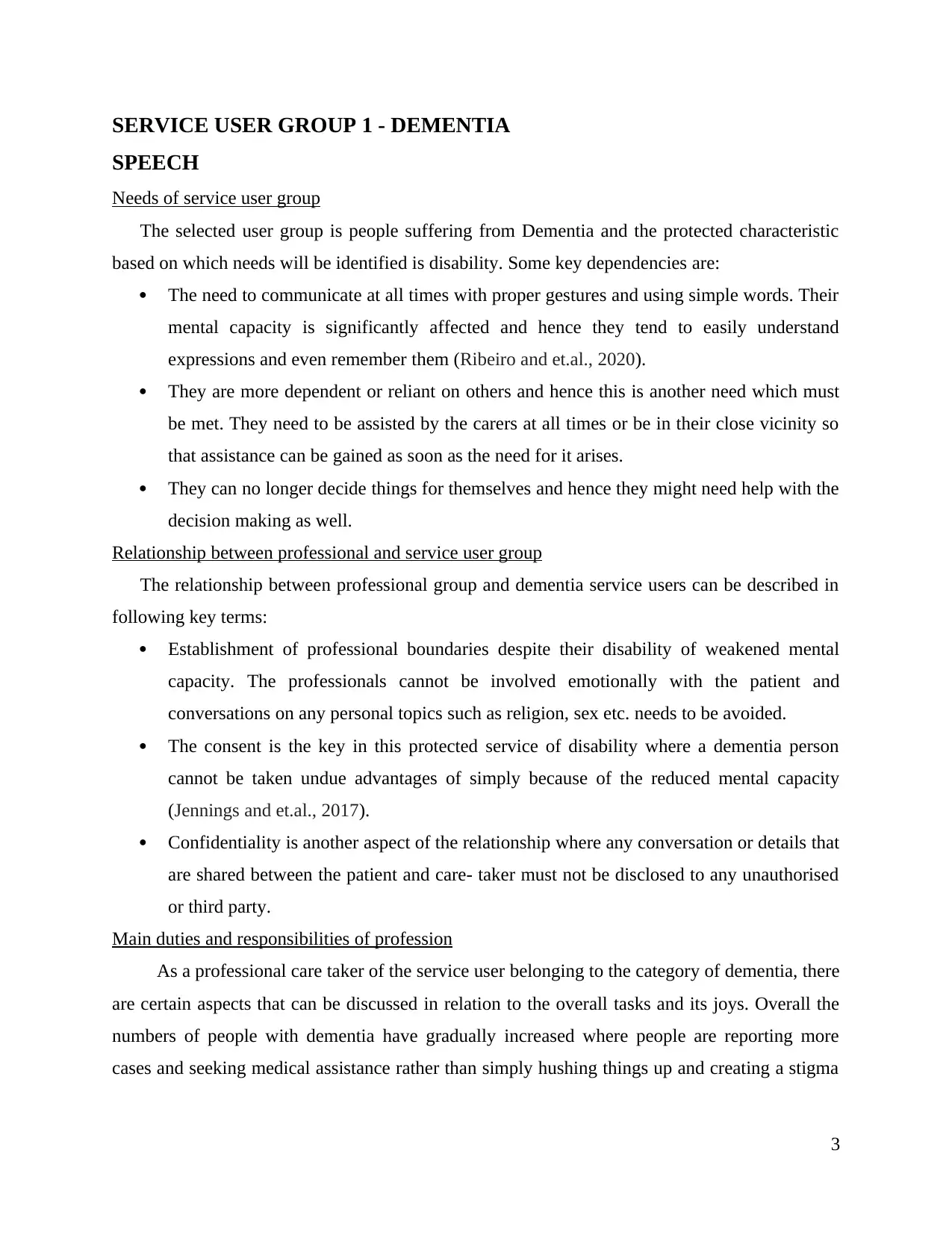
SERVICE USER GROUP 1 - DEMENTIA
SPEECH
Needs of service user group
The selected user group is people suffering from Dementia and the protected characteristic
based on which needs will be identified is disability. Some key dependencies are:
The need to communicate at all times with proper gestures and using simple words. Their
mental capacity is significantly affected and hence they tend to easily understand
expressions and even remember them (Ribeiro and et.al., 2020).
They are more dependent or reliant on others and hence this is another need which must
be met. They need to be assisted by the carers at all times or be in their close vicinity so
that assistance can be gained as soon as the need for it arises.
They can no longer decide things for themselves and hence they might need help with the
decision making as well.
Relationship between professional and service user group
The relationship between professional group and dementia service users can be described in
following key terms:
Establishment of professional boundaries despite their disability of weakened mental
capacity. The professionals cannot be involved emotionally with the patient and
conversations on any personal topics such as religion, sex etc. needs to be avoided.
The consent is the key in this protected service of disability where a dementia person
cannot be taken undue advantages of simply because of the reduced mental capacity
(Jennings and et.al., 2017).
Confidentiality is another aspect of the relationship where any conversation or details that
are shared between the patient and care- taker must not be disclosed to any unauthorised
or third party.
Main duties and responsibilities of profession
As a professional care taker of the service user belonging to the category of dementia, there
are certain aspects that can be discussed in relation to the overall tasks and its joys. Overall the
numbers of people with dementia have gradually increased where people are reporting more
cases and seeking medical assistance rather than simply hushing things up and creating a stigma
3
SPEECH
Needs of service user group
The selected user group is people suffering from Dementia and the protected characteristic
based on which needs will be identified is disability. Some key dependencies are:
The need to communicate at all times with proper gestures and using simple words. Their
mental capacity is significantly affected and hence they tend to easily understand
expressions and even remember them (Ribeiro and et.al., 2020).
They are more dependent or reliant on others and hence this is another need which must
be met. They need to be assisted by the carers at all times or be in their close vicinity so
that assistance can be gained as soon as the need for it arises.
They can no longer decide things for themselves and hence they might need help with the
decision making as well.
Relationship between professional and service user group
The relationship between professional group and dementia service users can be described in
following key terms:
Establishment of professional boundaries despite their disability of weakened mental
capacity. The professionals cannot be involved emotionally with the patient and
conversations on any personal topics such as religion, sex etc. needs to be avoided.
The consent is the key in this protected service of disability where a dementia person
cannot be taken undue advantages of simply because of the reduced mental capacity
(Jennings and et.al., 2017).
Confidentiality is another aspect of the relationship where any conversation or details that
are shared between the patient and care- taker must not be disclosed to any unauthorised
or third party.
Main duties and responsibilities of profession
As a professional care taker of the service user belonging to the category of dementia, there
are certain aspects that can be discussed in relation to the overall tasks and its joys. Overall the
numbers of people with dementia have gradually increased where people are reporting more
cases and seeking medical assistance rather than simply hushing things up and creating a stigma
3
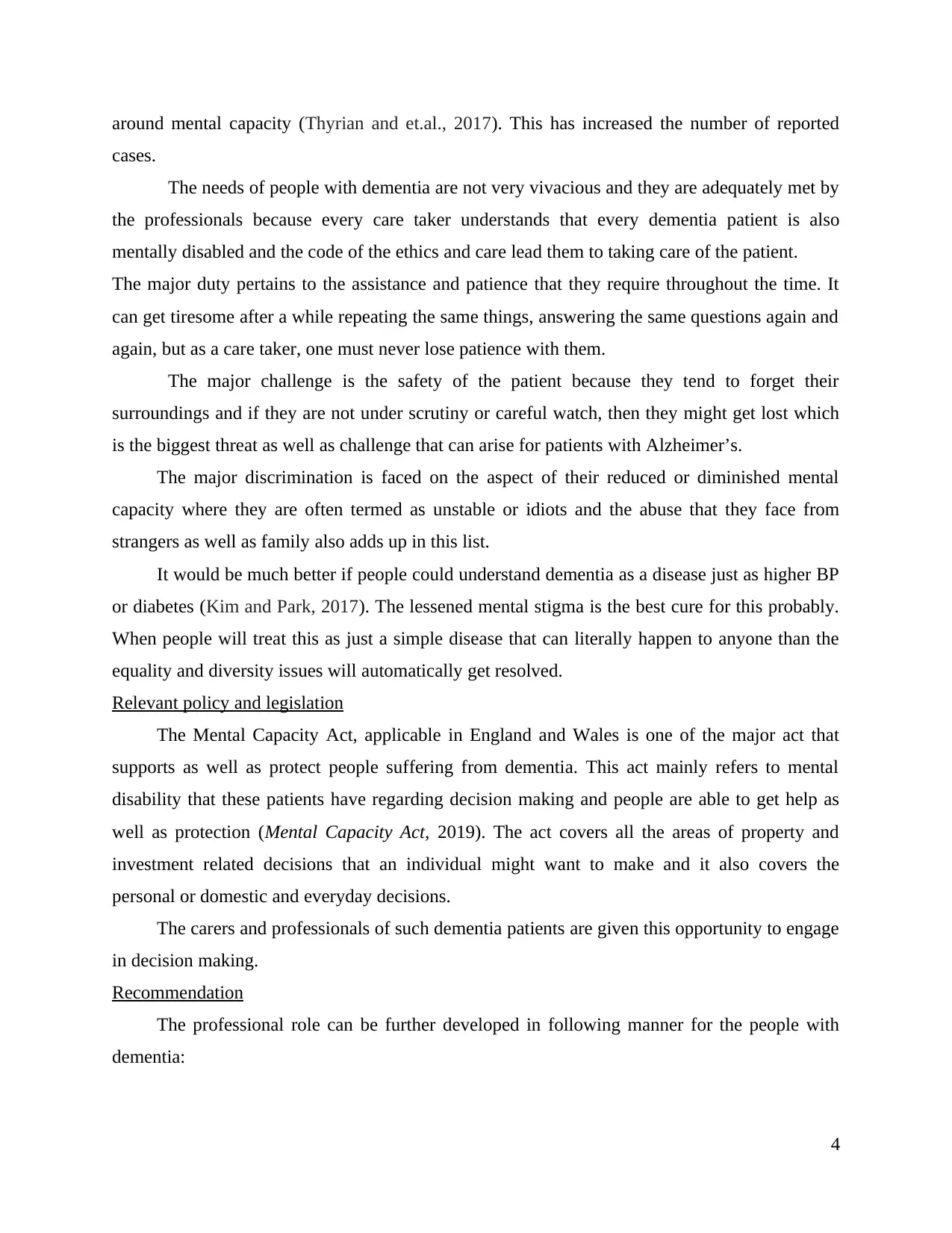
around mental capacity (Thyrian and et.al., 2017). This has increased the number of reported
cases.
The needs of people with dementia are not very vivacious and they are adequately met by
the professionals because every care taker understands that every dementia patient is also
mentally disabled and the code of the ethics and care lead them to taking care of the patient.
The major duty pertains to the assistance and patience that they require throughout the time. It
can get tiresome after a while repeating the same things, answering the same questions again and
again, but as a care taker, one must never lose patience with them.
The major challenge is the safety of the patient because they tend to forget their
surroundings and if they are not under scrutiny or careful watch, then they might get lost which
is the biggest threat as well as challenge that can arise for patients with Alzheimer’s.
The major discrimination is faced on the aspect of their reduced or diminished mental
capacity where they are often termed as unstable or idiots and the abuse that they face from
strangers as well as family also adds up in this list.
It would be much better if people could understand dementia as a disease just as higher BP
or diabetes (Kim and Park, 2017). The lessened mental stigma is the best cure for this probably.
When people will treat this as just a simple disease that can literally happen to anyone than the
equality and diversity issues will automatically get resolved.
Relevant policy and legislation
The Mental Capacity Act, applicable in England and Wales is one of the major act that
supports as well as protect people suffering from dementia. This act mainly refers to mental
disability that these patients have regarding decision making and people are able to get help as
well as protection (Mental Capacity Act, 2019). The act covers all the areas of property and
investment related decisions that an individual might want to make and it also covers the
personal or domestic and everyday decisions.
The carers and professionals of such dementia patients are given this opportunity to engage
in decision making.
Recommendation
The professional role can be further developed in following manner for the people with
dementia:
4
cases.
The needs of people with dementia are not very vivacious and they are adequately met by
the professionals because every care taker understands that every dementia patient is also
mentally disabled and the code of the ethics and care lead them to taking care of the patient.
The major duty pertains to the assistance and patience that they require throughout the time. It
can get tiresome after a while repeating the same things, answering the same questions again and
again, but as a care taker, one must never lose patience with them.
The major challenge is the safety of the patient because they tend to forget their
surroundings and if they are not under scrutiny or careful watch, then they might get lost which
is the biggest threat as well as challenge that can arise for patients with Alzheimer’s.
The major discrimination is faced on the aspect of their reduced or diminished mental
capacity where they are often termed as unstable or idiots and the abuse that they face from
strangers as well as family also adds up in this list.
It would be much better if people could understand dementia as a disease just as higher BP
or diabetes (Kim and Park, 2017). The lessened mental stigma is the best cure for this probably.
When people will treat this as just a simple disease that can literally happen to anyone than the
equality and diversity issues will automatically get resolved.
Relevant policy and legislation
The Mental Capacity Act, applicable in England and Wales is one of the major act that
supports as well as protect people suffering from dementia. This act mainly refers to mental
disability that these patients have regarding decision making and people are able to get help as
well as protection (Mental Capacity Act, 2019). The act covers all the areas of property and
investment related decisions that an individual might want to make and it also covers the
personal or domestic and everyday decisions.
The carers and professionals of such dementia patients are given this opportunity to engage
in decision making.
Recommendation
The professional role can be further developed in following manner for the people with
dementia:
4
Secure Best Marks with AI Grader
Need help grading? Try our AI Grader for instant feedback on your assignments.
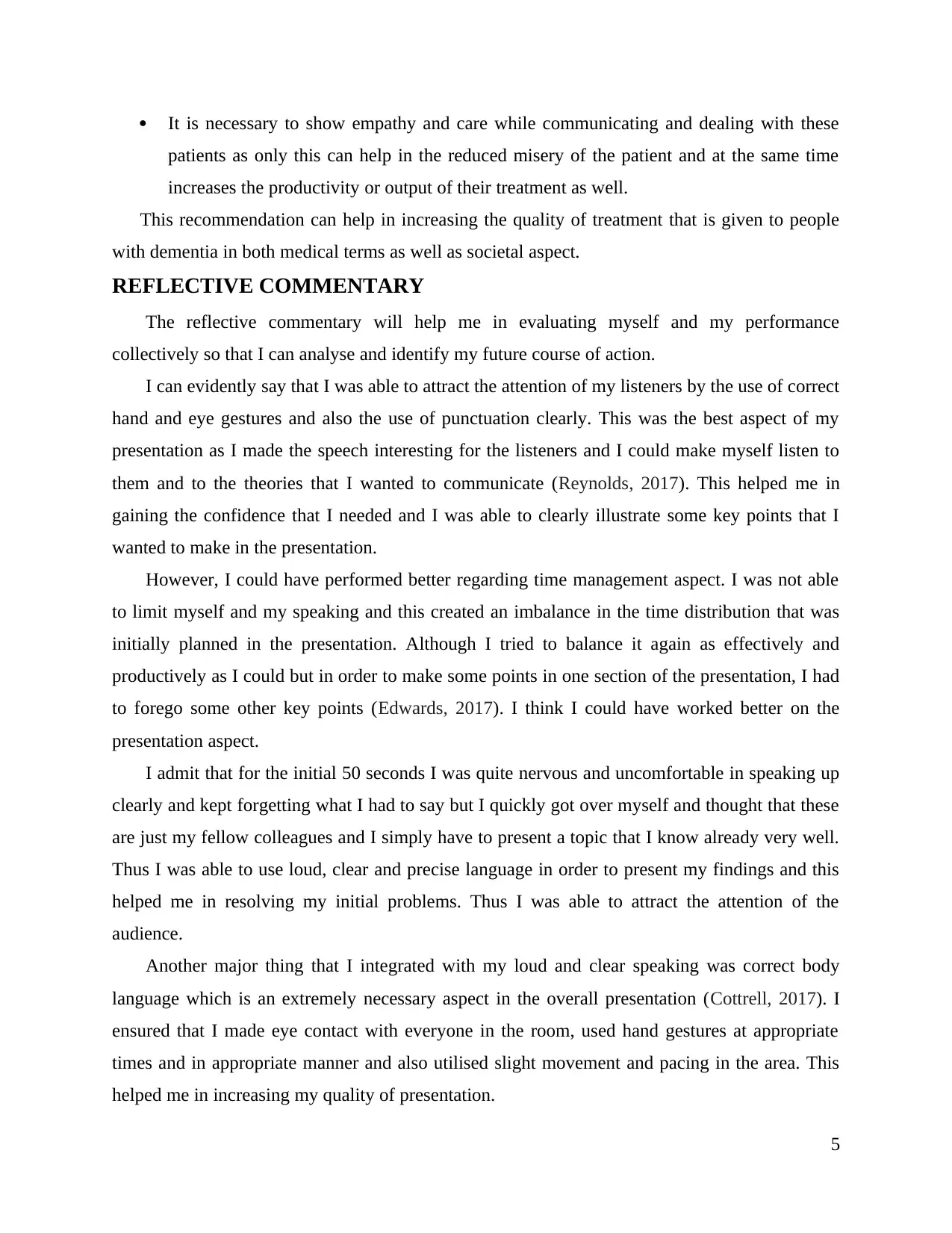
It is necessary to show empathy and care while communicating and dealing with these
patients as only this can help in the reduced misery of the patient and at the same time
increases the productivity or output of their treatment as well.
This recommendation can help in increasing the quality of treatment that is given to people
with dementia in both medical terms as well as societal aspect.
REFLECTIVE COMMENTARY
The reflective commentary will help me in evaluating myself and my performance
collectively so that I can analyse and identify my future course of action.
I can evidently say that I was able to attract the attention of my listeners by the use of correct
hand and eye gestures and also the use of punctuation clearly. This was the best aspect of my
presentation as I made the speech interesting for the listeners and I could make myself listen to
them and to the theories that I wanted to communicate (Reynolds, 2017). This helped me in
gaining the confidence that I needed and I was able to clearly illustrate some key points that I
wanted to make in the presentation.
However, I could have performed better regarding time management aspect. I was not able
to limit myself and my speaking and this created an imbalance in the time distribution that was
initially planned in the presentation. Although I tried to balance it again as effectively and
productively as I could but in order to make some points in one section of the presentation, I had
to forego some other key points (Edwards, 2017). I think I could have worked better on the
presentation aspect.
I admit that for the initial 50 seconds I was quite nervous and uncomfortable in speaking up
clearly and kept forgetting what I had to say but I quickly got over myself and thought that these
are just my fellow colleagues and I simply have to present a topic that I know already very well.
Thus I was able to use loud, clear and precise language in order to present my findings and this
helped me in resolving my initial problems. Thus I was able to attract the attention of the
audience.
Another major thing that I integrated with my loud and clear speaking was correct body
language which is an extremely necessary aspect in the overall presentation (Cottrell, 2017). I
ensured that I made eye contact with everyone in the room, used hand gestures at appropriate
times and in appropriate manner and also utilised slight movement and pacing in the area. This
helped me in increasing my quality of presentation.
5
patients as only this can help in the reduced misery of the patient and at the same time
increases the productivity or output of their treatment as well.
This recommendation can help in increasing the quality of treatment that is given to people
with dementia in both medical terms as well as societal aspect.
REFLECTIVE COMMENTARY
The reflective commentary will help me in evaluating myself and my performance
collectively so that I can analyse and identify my future course of action.
I can evidently say that I was able to attract the attention of my listeners by the use of correct
hand and eye gestures and also the use of punctuation clearly. This was the best aspect of my
presentation as I made the speech interesting for the listeners and I could make myself listen to
them and to the theories that I wanted to communicate (Reynolds, 2017). This helped me in
gaining the confidence that I needed and I was able to clearly illustrate some key points that I
wanted to make in the presentation.
However, I could have performed better regarding time management aspect. I was not able
to limit myself and my speaking and this created an imbalance in the time distribution that was
initially planned in the presentation. Although I tried to balance it again as effectively and
productively as I could but in order to make some points in one section of the presentation, I had
to forego some other key points (Edwards, 2017). I think I could have worked better on the
presentation aspect.
I admit that for the initial 50 seconds I was quite nervous and uncomfortable in speaking up
clearly and kept forgetting what I had to say but I quickly got over myself and thought that these
are just my fellow colleagues and I simply have to present a topic that I know already very well.
Thus I was able to use loud, clear and precise language in order to present my findings and this
helped me in resolving my initial problems. Thus I was able to attract the attention of the
audience.
Another major thing that I integrated with my loud and clear speaking was correct body
language which is an extremely necessary aspect in the overall presentation (Cottrell, 2017). I
ensured that I made eye contact with everyone in the room, used hand gestures at appropriate
times and in appropriate manner and also utilised slight movement and pacing in the area. This
helped me in increasing my quality of presentation.
5
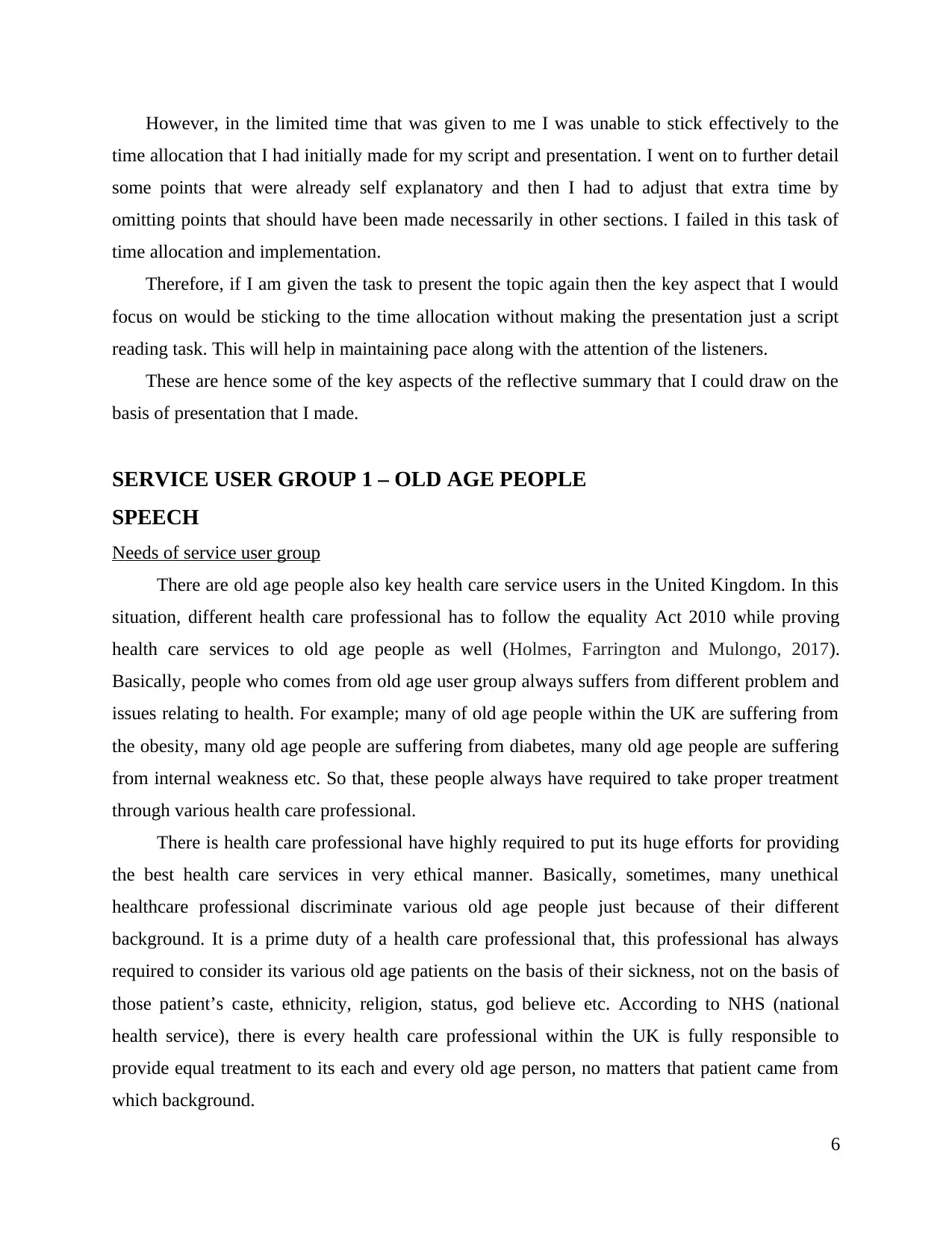
However, in the limited time that was given to me I was unable to stick effectively to the
time allocation that I had initially made for my script and presentation. I went on to further detail
some points that were already self explanatory and then I had to adjust that extra time by
omitting points that should have been made necessarily in other sections. I failed in this task of
time allocation and implementation.
Therefore, if I am given the task to present the topic again then the key aspect that I would
focus on would be sticking to the time allocation without making the presentation just a script
reading task. This will help in maintaining pace along with the attention of the listeners.
These are hence some of the key aspects of the reflective summary that I could draw on the
basis of presentation that I made.
SERVICE USER GROUP 1 – OLD AGE PEOPLE
SPEECH
Needs of service user group
There are old age people also key health care service users in the United Kingdom. In this
situation, different health care professional has to follow the equality Act 2010 while proving
health care services to old age people as well (Holmes, Farrington and Mulongo, 2017).
Basically, people who comes from old age user group always suffers from different problem and
issues relating to health. For example; many of old age people within the UK are suffering from
the obesity, many old age people are suffering from diabetes, many old age people are suffering
from internal weakness etc. So that, these people always have required to take proper treatment
through various health care professional.
There is health care professional have highly required to put its huge efforts for providing
the best health care services in very ethical manner. Basically, sometimes, many unethical
healthcare professional discriminate various old age people just because of their different
background. It is a prime duty of a health care professional that, this professional has always
required to consider its various old age patients on the basis of their sickness, not on the basis of
those patient’s caste, ethnicity, religion, status, god believe etc. According to NHS (national
health service), there is every health care professional within the UK is fully responsible to
provide equal treatment to its each and every old age person, no matters that patient came from
which background.
6
time allocation that I had initially made for my script and presentation. I went on to further detail
some points that were already self explanatory and then I had to adjust that extra time by
omitting points that should have been made necessarily in other sections. I failed in this task of
time allocation and implementation.
Therefore, if I am given the task to present the topic again then the key aspect that I would
focus on would be sticking to the time allocation without making the presentation just a script
reading task. This will help in maintaining pace along with the attention of the listeners.
These are hence some of the key aspects of the reflective summary that I could draw on the
basis of presentation that I made.
SERVICE USER GROUP 1 – OLD AGE PEOPLE
SPEECH
Needs of service user group
There are old age people also key health care service users in the United Kingdom. In this
situation, different health care professional has to follow the equality Act 2010 while proving
health care services to old age people as well (Holmes, Farrington and Mulongo, 2017).
Basically, people who comes from old age user group always suffers from different problem and
issues relating to health. For example; many of old age people within the UK are suffering from
the obesity, many old age people are suffering from diabetes, many old age people are suffering
from internal weakness etc. So that, these people always have required to take proper treatment
through various health care professional.
There is health care professional have highly required to put its huge efforts for providing
the best health care services in very ethical manner. Basically, sometimes, many unethical
healthcare professional discriminate various old age people just because of their different
background. It is a prime duty of a health care professional that, this professional has always
required to consider its various old age patients on the basis of their sickness, not on the basis of
those patient’s caste, ethnicity, religion, status, god believe etc. According to NHS (national
health service), there is every health care professional within the UK is fully responsible to
provide equal treatment to its each and every old age person, no matters that patient came from
which background.
6
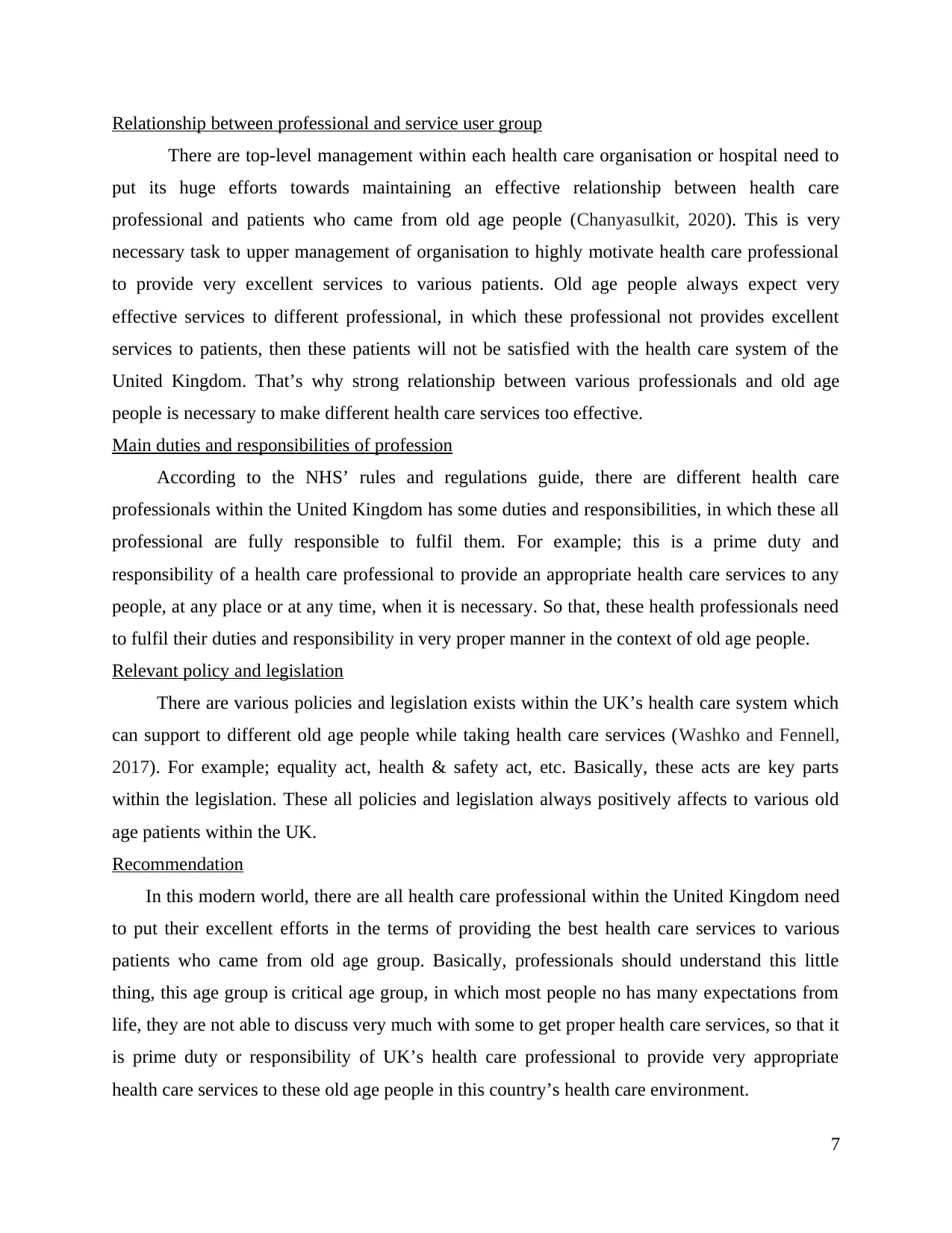
Relationship between professional and service user group
There are top-level management within each health care organisation or hospital need to
put its huge efforts towards maintaining an effective relationship between health care
professional and patients who came from old age people (Chanyasulkit, 2020). This is very
necessary task to upper management of organisation to highly motivate health care professional
to provide very excellent services to various patients. Old age people always expect very
effective services to different professional, in which these professional not provides excellent
services to patients, then these patients will not be satisfied with the health care system of the
United Kingdom. That’s why strong relationship between various professionals and old age
people is necessary to make different health care services too effective.
Main duties and responsibilities of profession
According to the NHS’ rules and regulations guide, there are different health care
professionals within the United Kingdom has some duties and responsibilities, in which these all
professional are fully responsible to fulfil them. For example; this is a prime duty and
responsibility of a health care professional to provide an appropriate health care services to any
people, at any place or at any time, when it is necessary. So that, these health professionals need
to fulfil their duties and responsibility in very proper manner in the context of old age people.
Relevant policy and legislation
There are various policies and legislation exists within the UK’s health care system which
can support to different old age people while taking health care services (Washko and Fennell,
2017). For example; equality act, health & safety act, etc. Basically, these acts are key parts
within the legislation. These all policies and legislation always positively affects to various old
age patients within the UK.
Recommendation
In this modern world, there are all health care professional within the United Kingdom need
to put their excellent efforts in the terms of providing the best health care services to various
patients who came from old age group. Basically, professionals should understand this little
thing, this age group is critical age group, in which most people no has many expectations from
life, they are not able to discuss very much with some to get proper health care services, so that it
is prime duty or responsibility of UK’s health care professional to provide very appropriate
health care services to these old age people in this country’s health care environment.
7
There are top-level management within each health care organisation or hospital need to
put its huge efforts towards maintaining an effective relationship between health care
professional and patients who came from old age people (Chanyasulkit, 2020). This is very
necessary task to upper management of organisation to highly motivate health care professional
to provide very excellent services to various patients. Old age people always expect very
effective services to different professional, in which these professional not provides excellent
services to patients, then these patients will not be satisfied with the health care system of the
United Kingdom. That’s why strong relationship between various professionals and old age
people is necessary to make different health care services too effective.
Main duties and responsibilities of profession
According to the NHS’ rules and regulations guide, there are different health care
professionals within the United Kingdom has some duties and responsibilities, in which these all
professional are fully responsible to fulfil them. For example; this is a prime duty and
responsibility of a health care professional to provide an appropriate health care services to any
people, at any place or at any time, when it is necessary. So that, these health professionals need
to fulfil their duties and responsibility in very proper manner in the context of old age people.
Relevant policy and legislation
There are various policies and legislation exists within the UK’s health care system which
can support to different old age people while taking health care services (Washko and Fennell,
2017). For example; equality act, health & safety act, etc. Basically, these acts are key parts
within the legislation. These all policies and legislation always positively affects to various old
age patients within the UK.
Recommendation
In this modern world, there are all health care professional within the United Kingdom need
to put their excellent efforts in the terms of providing the best health care services to various
patients who came from old age group. Basically, professionals should understand this little
thing, this age group is critical age group, in which most people no has many expectations from
life, they are not able to discuss very much with some to get proper health care services, so that it
is prime duty or responsibility of UK’s health care professional to provide very appropriate
health care services to these old age people in this country’s health care environment.
7
Paraphrase This Document
Need a fresh take? Get an instant paraphrase of this document with our AI Paraphraser
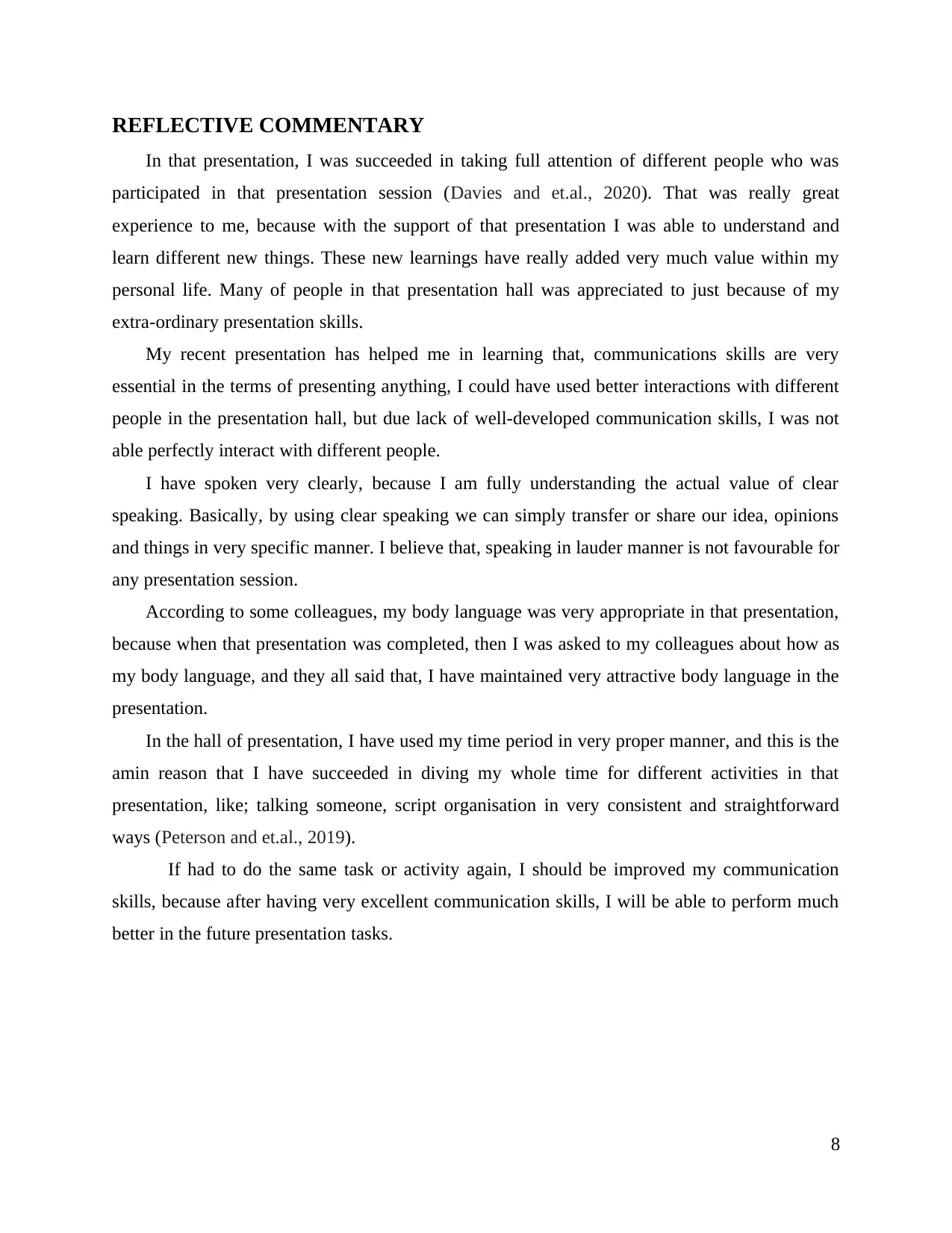
REFLECTIVE COMMENTARY
In that presentation, I was succeeded in taking full attention of different people who was
participated in that presentation session (Davies and et.al., 2020). That was really great
experience to me, because with the support of that presentation I was able to understand and
learn different new things. These new learnings have really added very much value within my
personal life. Many of people in that presentation hall was appreciated to just because of my
extra-ordinary presentation skills.
My recent presentation has helped me in learning that, communications skills are very
essential in the terms of presenting anything, I could have used better interactions with different
people in the presentation hall, but due lack of well-developed communication skills, I was not
able perfectly interact with different people.
I have spoken very clearly, because I am fully understanding the actual value of clear
speaking. Basically, by using clear speaking we can simply transfer or share our idea, opinions
and things in very specific manner. I believe that, speaking in lauder manner is not favourable for
any presentation session.
According to some colleagues, my body language was very appropriate in that presentation,
because when that presentation was completed, then I was asked to my colleagues about how as
my body language, and they all said that, I have maintained very attractive body language in the
presentation.
In the hall of presentation, I have used my time period in very proper manner, and this is the
amin reason that I have succeeded in diving my whole time for different activities in that
presentation, like; talking someone, script organisation in very consistent and straightforward
ways (Peterson and et.al., 2019).
If had to do the same task or activity again, I should be improved my communication
skills, because after having very excellent communication skills, I will be able to perform much
better in the future presentation tasks.
8
In that presentation, I was succeeded in taking full attention of different people who was
participated in that presentation session (Davies and et.al., 2020). That was really great
experience to me, because with the support of that presentation I was able to understand and
learn different new things. These new learnings have really added very much value within my
personal life. Many of people in that presentation hall was appreciated to just because of my
extra-ordinary presentation skills.
My recent presentation has helped me in learning that, communications skills are very
essential in the terms of presenting anything, I could have used better interactions with different
people in the presentation hall, but due lack of well-developed communication skills, I was not
able perfectly interact with different people.
I have spoken very clearly, because I am fully understanding the actual value of clear
speaking. Basically, by using clear speaking we can simply transfer or share our idea, opinions
and things in very specific manner. I believe that, speaking in lauder manner is not favourable for
any presentation session.
According to some colleagues, my body language was very appropriate in that presentation,
because when that presentation was completed, then I was asked to my colleagues about how as
my body language, and they all said that, I have maintained very attractive body language in the
presentation.
In the hall of presentation, I have used my time period in very proper manner, and this is the
amin reason that I have succeeded in diving my whole time for different activities in that
presentation, like; talking someone, script organisation in very consistent and straightforward
ways (Peterson and et.al., 2019).
If had to do the same task or activity again, I should be improved my communication
skills, because after having very excellent communication skills, I will be able to perform much
better in the future presentation tasks.
8
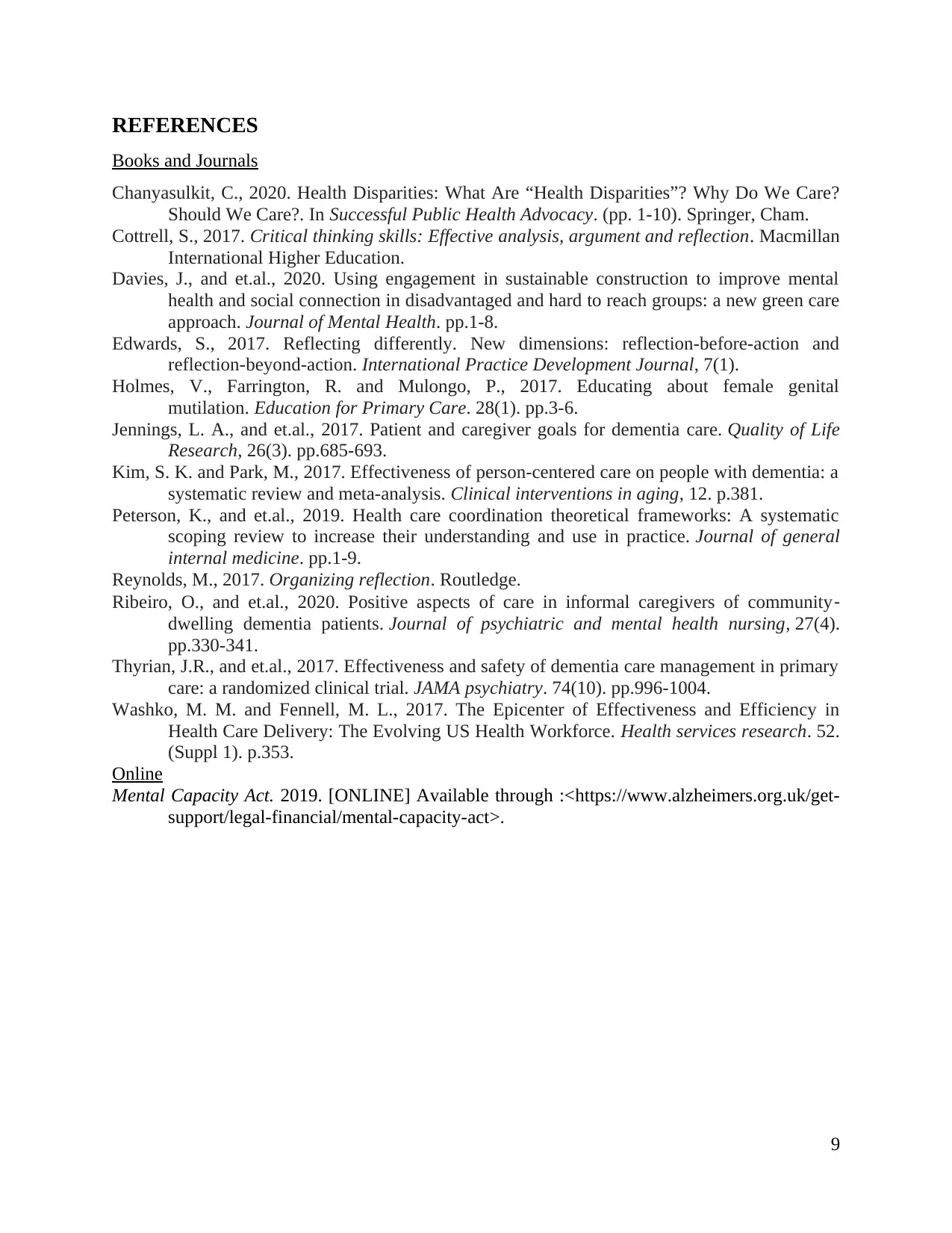
REFERENCES
Books and Journals
Chanyasulkit, C., 2020. Health Disparities: What Are “Health Disparities”? Why Do We Care?
Should We Care?. In Successful Public Health Advocacy. (pp. 1-10). Springer, Cham.
Cottrell, S., 2017. Critical thinking skills: Effective analysis, argument and reflection. Macmillan
International Higher Education.
Davies, J., and et.al., 2020. Using engagement in sustainable construction to improve mental
health and social connection in disadvantaged and hard to reach groups: a new green care
approach. Journal of Mental Health. pp.1-8.
Edwards, S., 2017. Reflecting differently. New dimensions: reflection-before-action and
reflection-beyond-action. International Practice Development Journal, 7(1).
Holmes, V., Farrington, R. and Mulongo, P., 2017. Educating about female genital
mutilation. Education for Primary Care. 28(1). pp.3-6.
Jennings, L. A., and et.al., 2017. Patient and caregiver goals for dementia care. Quality of Life
Research, 26(3). pp.685-693.
Kim, S. K. and Park, M., 2017. Effectiveness of person-centered care on people with dementia: a
systematic review and meta-analysis. Clinical interventions in aging, 12. p.381.
Peterson, K., and et.al., 2019. Health care coordination theoretical frameworks: A systematic
scoping review to increase their understanding and use in practice. Journal of general
internal medicine. pp.1-9.
Reynolds, M., 2017. Organizing reflection. Routledge.
Ribeiro, O., and et.al., 2020. Positive aspects of care in informal caregivers of community‐
dwelling dementia patients. Journal of psychiatric and mental health nursing, 27(4).
pp.330-341.
Thyrian, J.R., and et.al., 2017. Effectiveness and safety of dementia care management in primary
care: a randomized clinical trial. JAMA psychiatry. 74(10). pp.996-1004.
Washko, M. M. and Fennell, M. L., 2017. The Epicenter of Effectiveness and Efficiency in
Health Care Delivery: The Evolving US Health Workforce. Health services research. 52.
(Suppl 1). p.353.
Online
Mental Capacity Act. 2019. [ONLINE] Available through :<https://www.alzheimers.org.uk/get-
support/legal-financial/mental-capacity-act>.
9
Books and Journals
Chanyasulkit, C., 2020. Health Disparities: What Are “Health Disparities”? Why Do We Care?
Should We Care?. In Successful Public Health Advocacy. (pp. 1-10). Springer, Cham.
Cottrell, S., 2017. Critical thinking skills: Effective analysis, argument and reflection. Macmillan
International Higher Education.
Davies, J., and et.al., 2020. Using engagement in sustainable construction to improve mental
health and social connection in disadvantaged and hard to reach groups: a new green care
approach. Journal of Mental Health. pp.1-8.
Edwards, S., 2017. Reflecting differently. New dimensions: reflection-before-action and
reflection-beyond-action. International Practice Development Journal, 7(1).
Holmes, V., Farrington, R. and Mulongo, P., 2017. Educating about female genital
mutilation. Education for Primary Care. 28(1). pp.3-6.
Jennings, L. A., and et.al., 2017. Patient and caregiver goals for dementia care. Quality of Life
Research, 26(3). pp.685-693.
Kim, S. K. and Park, M., 2017. Effectiveness of person-centered care on people with dementia: a
systematic review and meta-analysis. Clinical interventions in aging, 12. p.381.
Peterson, K., and et.al., 2019. Health care coordination theoretical frameworks: A systematic
scoping review to increase their understanding and use in practice. Journal of general
internal medicine. pp.1-9.
Reynolds, M., 2017. Organizing reflection. Routledge.
Ribeiro, O., and et.al., 2020. Positive aspects of care in informal caregivers of community‐
dwelling dementia patients. Journal of psychiatric and mental health nursing, 27(4).
pp.330-341.
Thyrian, J.R., and et.al., 2017. Effectiveness and safety of dementia care management in primary
care: a randomized clinical trial. JAMA psychiatry. 74(10). pp.996-1004.
Washko, M. M. and Fennell, M. L., 2017. The Epicenter of Effectiveness and Efficiency in
Health Care Delivery: The Evolving US Health Workforce. Health services research. 52.
(Suppl 1). p.353.
Online
Mental Capacity Act. 2019. [ONLINE] Available through :<https://www.alzheimers.org.uk/get-
support/legal-financial/mental-capacity-act>.
9

10
1 out of 10
Related Documents
Your All-in-One AI-Powered Toolkit for Academic Success.
+13062052269
info@desklib.com
Available 24*7 on WhatsApp / Email
![[object Object]](/_next/static/media/star-bottom.7253800d.svg)
Unlock your academic potential
© 2024 | Zucol Services PVT LTD | All rights reserved.





